#Simply Samurai
Explore tagged Tumblr posts
Text
instagram
The Kanabo is quickly becoming one of my favorite weapons in my collection! 👹
W/ the world of premiere of Assassin's Creed Shadows I hope to see this beauty used all of it's armor crushing glory! ⚔️
Stay tuned for more demonstrations of this things destructive capabilites! 💪🏿👹🙌🏿
#Kult of Athena#KultOfAthena#WorldOfKOA#Simply Samurai#SimplySamurai#Seto Waddell#Spencer Waddell#Kanabo#club#mace#Japanese Weapons#Asian Weapons#Assassin's Creed#Assassin's Creed Shadows#AC Shadows#Oni#Oni Kanabo#KOA Exclusive#Japanese Folklore#video games#Instagram
7 notes
·
View notes
Text



#nige jouzu no wakagimi#the elusive samurai#nigewaka#nigewakaedit#houjou tokiyuki#anime#anime gif#animeedit#gifset#fyanimegifs#himawaari#tuserelena#userdabiluna#artsgifs#the artstyle of this series is simply magnificent :))
350 notes
·
View notes
Text
Sorry I had to
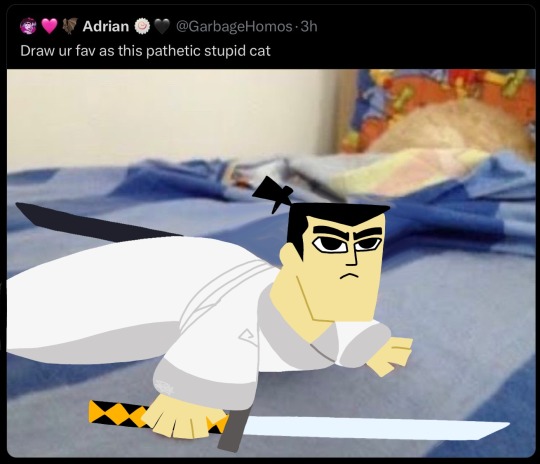
Og pic:
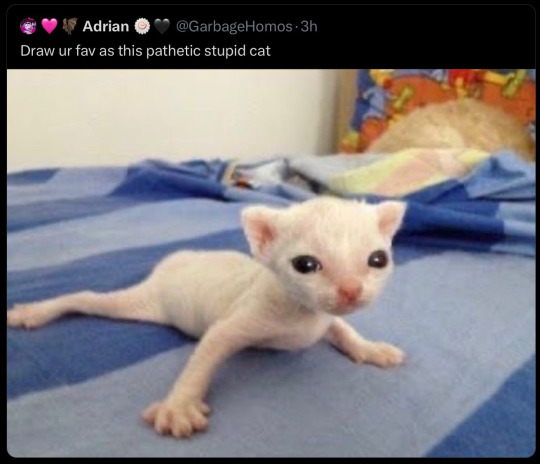
samurai cat 💀
REMAKE >
#samurai jack#art#sj#sj art#jack#samurai jack art#first time trying to do the sj lineless artstyle 😭#sorry I simply love this show#it's too good#I can't believe I didn't know any of it before#I LOVE THIS SHOW AAAAHHHH#cat#omg the mini samurai#AUUGGHHH 💖💕#hyperfixation moment#rad art#radaverse
455 notes
·
View notes
Text
Thinking about the crazy love triangle situation in Blue Eye Samurai and debating heavily with myself on how I'd like to see it conclude. And yeah this discussion can be thought of purely as shipping, headcanons, and fandom fun. But when analysing the show and engaging with it in a more in-depth, almost-literary level, it's impossible to dismiss who Mizu's potential love interests are and how different endgame romances would affect her character arc and the overall story and themes.
So in this post I'd like to look at the love triangle a bit more closely, and speculate on where the story will take this.
DISCLAIMER: It is my personal interpretation of the text that Mizu is non-binary—I use this as an umbrella term denoting any gender that does not adhere to the binary restrictions, norms, and expectations of what it means to be either a man or woman in a particular society; it's not just an androgynous "third gender" that exclusively uses they/them pronouns. Thus, while I personally believe Mizu is not strictly a cis woman, she does still identify with womanhood, despite definitely feeling a level of detachment from it due to living as a man for so long. With that being said, I will be using she/her pronouns for Mizu in this post, but please note that this is purely personal preference. Everyone is free to interpret the text the way they like. That's the fun of fiction. Now, without further ado, let's proceed.
Okay so, thinking about the pairings on a purely surface level, and even before i got into the show, I was pinning my hopes on some lesbianism going on between Mizu and Akemi, and the show does hint at this; in Ep1, during their first encounter in Kyoto, there is the famous slow-mo shot of their eyes meeting, Mizu's lips slightly parted as she is unable to tear her gaze away from Akemi, while sweet string music plays in the background. This is clear romantic framing, and a marker of attraction. If Mizu was a cishet man, there would be no question that this is a potential love interest.
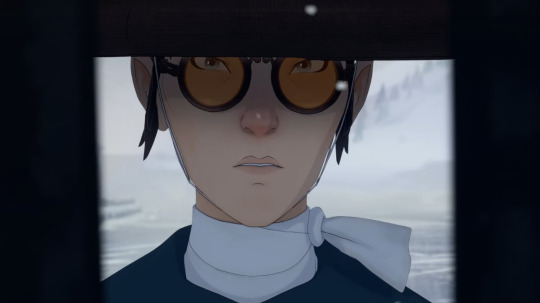
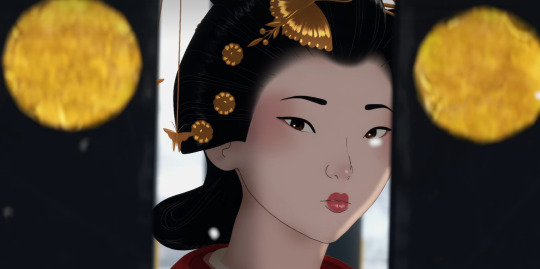
But then, in the same episode, we meet Taigen, who is introduced to us firstly from hearing Akemi's father describe him as "a fierce and undefeated young samurai", the "best swordsman in the best school" and "a fisherman's son from Kohama [...] whose rise reminds [him] of [his] own."
In the next scene, we meet him in person as Akemi's fiance, and he seems sweet enough. He even gives her sweets! In exchange, Akemi gives him gold, and he feels a bit ashamed that he doesn't have anything better to offer her. But Akemi accepts him and his gift wholeheartedly and flirts with him a little, which makes him smile kinda shyly.
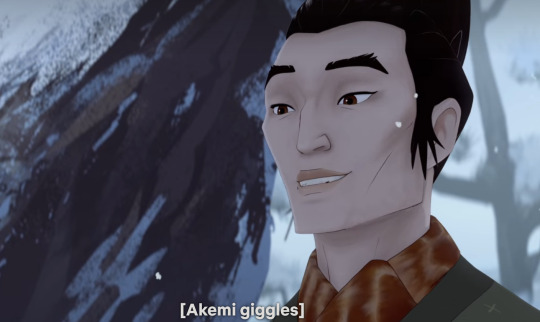
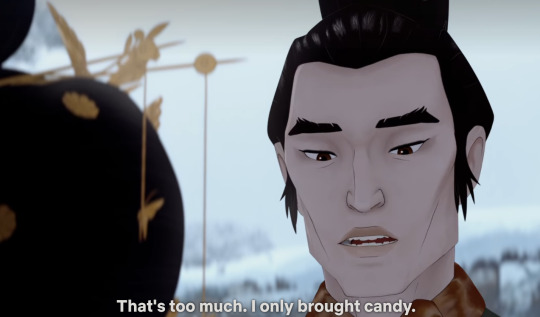
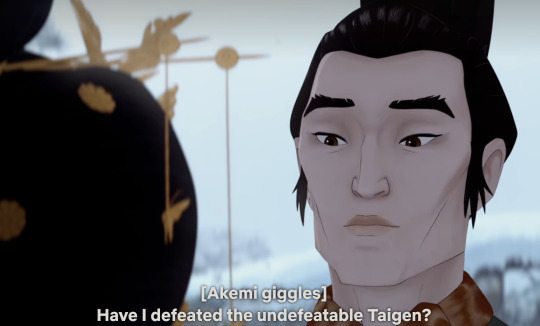
When Akemi confirms their engagement, Taigen is in disbelief because he has no status or noble background, but Akemi reassures him.
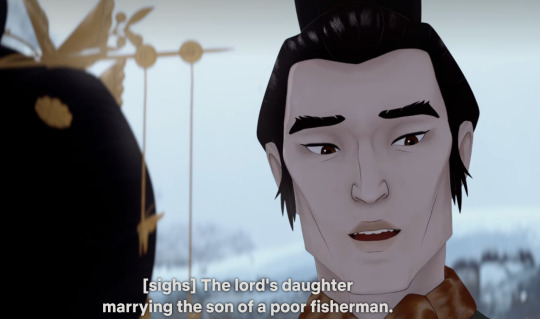
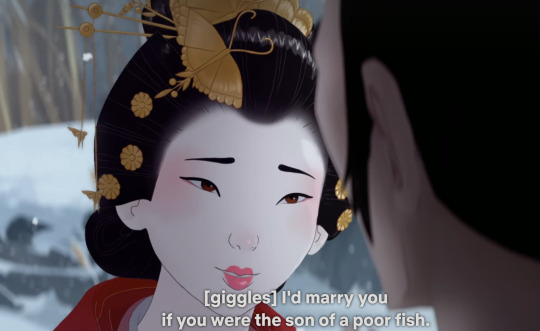
So from these first few scenes, we're introduced to Taigen as an honourable and strong samurai, but also as a man who is sweet and gentle with the woman he is about to marry, as well as aware of his own inferiority when compared to Akemi's high station.
Our view of him then changes as his true self is revealed: he is an arrogant and smug bastard among his peers, but more importantly, he is the terrible bully from Mizu's childhood.
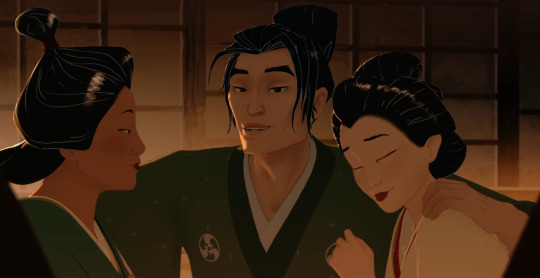
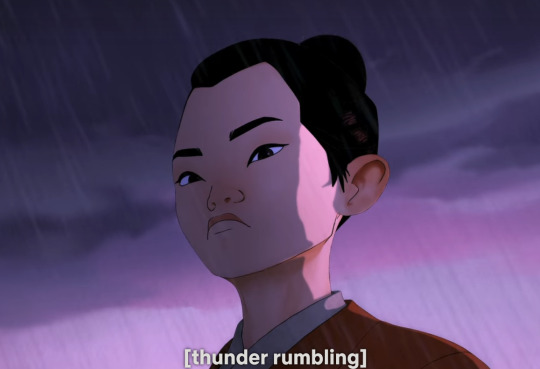
And it is this side of Taigen--pompous jerk and unrepentant xenophobic bully--that we continue to see as the show goes on, and it's safe to say that this is his real self, sans any pretense of humility and modesty. Around anyone who isn't an outright superior in terms of class and power (ie. Akemi's father, the shogun), Taigen never hesitates to assert his own authority and "greatness."

But as the show goes on, he gets caught by Heiji Shindo's men, and then tortured. And that's when we see, okay, turns out he's not that bad. He's honourable; "honour" is not just meaningless and superficial pedantry for him, but an internalised, guiding principle.
He was a cruel asshat throughout Mizu's childhood, but in a prejudiced and xenophobic society, he was just playing by the rules. As a child, he knew he was at the bottom of society, but when met with someone even lower ranked than him (Mizu), he can project all those prejudices and insecurities onto someone else. This way of thinking--"if you can't beat 'em, join em"--is what allowed him to climb up the ranks despite being some dirt poor kid from an abusive household*.
*Well, that combined with his cismale privilege of course, because this would not be an option for a woman in similar circumstances.
Thus, his upholding of honour also exemplifies how Taigen embodies the ideals and rules of his society. His insistence on duelling Mizu is another more blatant example of this. He doesn't want revenge like Mizu does. He wants to be accepted by society, within the bounds that society has placed, and that means that his only two options following his defeat at the Shindo dojo were to either chase Mizu down and get his damn duel, or kill himself for his humiliating defeat.
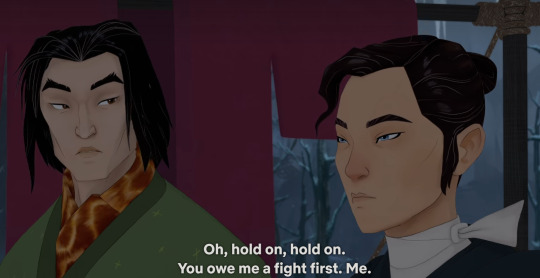
Now! Moving on from Taigen, let's go back to the other end of this little love triangle: Akemi.
Mizu and Akemi only properly meet in Ep4. During their first meeting, when Akemi tries to poison Mizu in Madame Kaji's brothel, she compliments Mizu's eyes, calling them "beautiful."
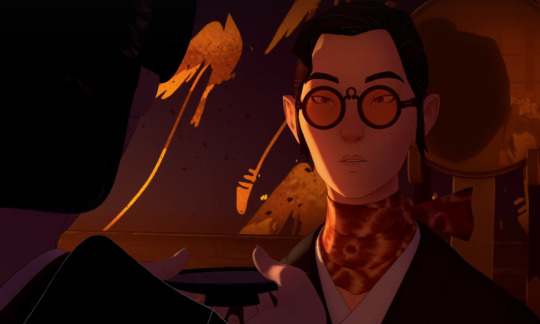
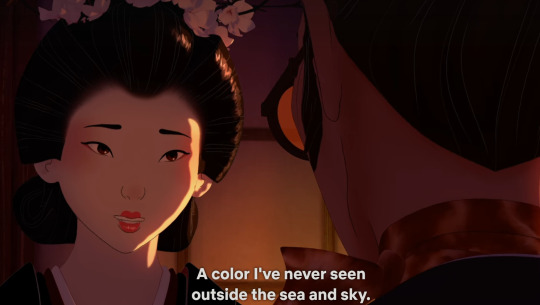
This seems to genuinely take mizu off-guard for a second before she coolly plays along. We know that Mizu recognises Akemi from the get-go, and thus sees through Akemi's ploy from a mile away. It's also safe to assume she'd expected false flattery, because Mizu understands full well that this tactic is how women get what they want: by using their 'feminine wiles' and playing up their naivety and innocence. But even so, it's interesting that Mizu actually seems surprised by Akemi's compliment.
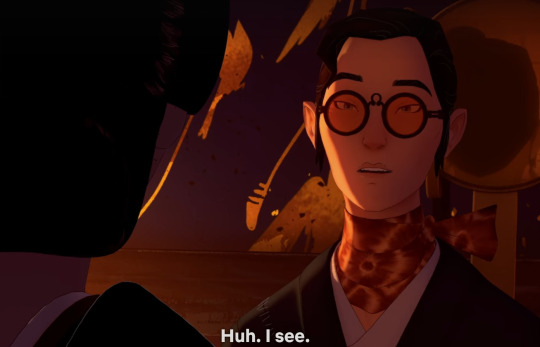
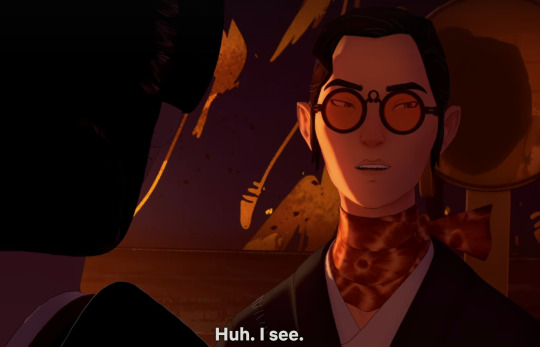
Then, after Mizu subtly taunts Akemi by lying about Taigen's death, she and Akemi have a bit of a scuffle, and then we get to Mizu saying this:
"Women in our world don't have a single good option. Except you, like some magical forest creature. You could have anything you want, but then you beg to eat trash."
(no screenshot because it's quite a long line but you get it)
Here we see Mizu's opinions on the marginalisation of (mostly poor and under-privileged) women stated outright, and underlying her words is also resentment. Because even though she and Akemi have shared experiences of female oppression, Mizu, unlike Akemi, was also poor, from a rural village, and is a racial minority. Mizu is triply oppressed, while Akemi only faces one primary form of oppression, and to someone as embittered by the world as Mizu is, to see Akemi "beg to eat trash" is a slap in the face, practically tone-deaf to the other injustices around her--injustices which Akemi has not shown much, or any, acknowledgement for at this point.
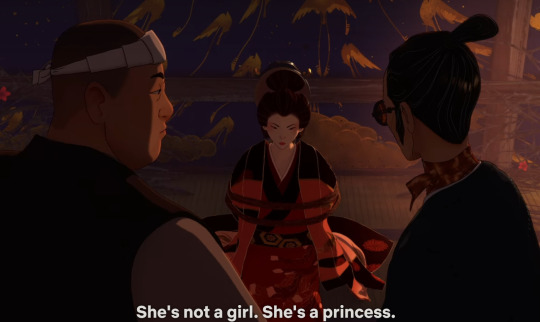
Then, after this scene, Mizu kills Kinuyo, and this unsettles her to a degree we've never seen from her before. She is visibly distraught, and the entire sequence hammers the theme of this episode (and arguably, a large portion of the show) into our heads: women in this world suffer. And even though Mizu is well aware of this fact, to commit this act is so visceral that is shakes her to her core, and it's what ultimately leads to the ambush of the Thousand Fangs.

But before the ambush, Mizu and Akemi talk a little again, and during this time Akemi taunts Mizu some more.
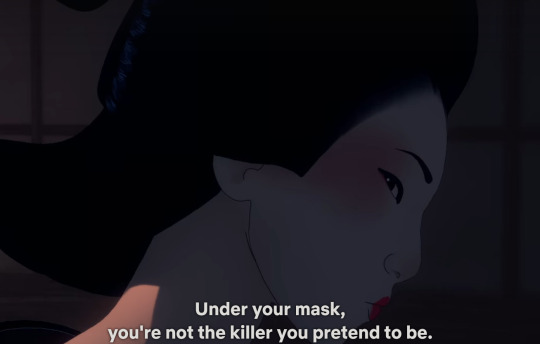
Right now, Mizu is exhausted to the point where (I believe) she even downs some sake, despite not usually drinking. Thus, worn down, she cuts Akemi's ropes and tells her, "Just go." Akemi recovers from her initial fear of Mizu's blade and taunts her some more, accurately seeing through Mizu's facade of coldness, recognising the raw anger there, and says this:
"I thought you had to be something special. Your face isn't even so scary. You're just... angry."
At this, Mizu is amused and compares Akemi to Taigen ("I see why he likes you. You're just like Taigen when we were children. A fucking brat.")
The reveal that Mizu and Taigen knew each other in childhood surprises Akemi, but before either of them can say more, everything goes to shit.
That's when we get to Ep5. This episode focuses primarily on Mizu, the central piece of this love triangle, and does the most out of all the episodes to shed some light on her character and goals, fleshing her out to be more than just the vengeful, highly proficient samurai we've seen thus far (symbolised by The Ronin), but also a person who is capable of love, domesticity and gentleness (symbolised by The Bride). But in the end, Mizu rejects both these ideals, instead becoming an Onryo, who is neither guided by pride/honour, nor love.
By 'reincarnating' into an Onryo, Mizu is able to win the day and save the women in the brothel. However, as she has now fully embraced her status as an Onryo, and is exhausted physically, mentally, and emotionally, she lets the Tokunobu clansmen take Akemi away while Akemi's screams echo in her ear.
Mizu says this choice is for Akemi's own good, that Akemi's better off; because Mizu is jaded and weary, and cannot afford the luxury of idealism, and thus must always be strictly practical and realistic. So of course that's why, in her view, yes, Akemi should not be wasting her time in a brothel where women are exploited and abused, nor should Akemi be so naive to think that her marriage with Taigen is even still possible. However, regardless of Mizu's views, it is not for her to decide, because though Akemi is privileged in some sense, she is still trapped and voiceless, and deserves the right to choose her own destiny.
But as it happens, in the end, though Akemi did not choose who she gets to marry, she DOES get to choose her next move when Edo burns down.
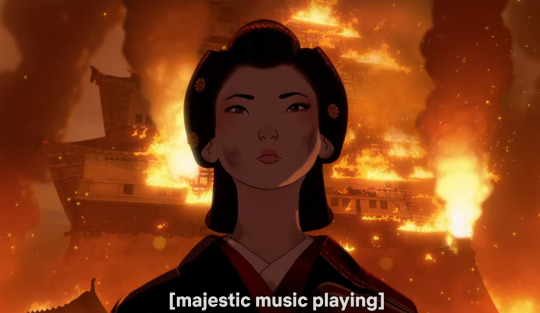
"I want to be great."
This one line is the key to her entire arc, which is only just beginning. We see she quickly has acquired the affection and good graces of the shogun's son after their wedding night and consummation, and with Madame Kaji and the girls now serving her, Akemi will only grow to become a prominent political player.
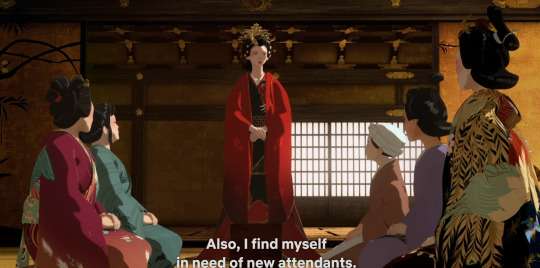
NOW, only after analysing the characters as they are within this season, only can we speculate how their arcs will continue as the show progresses.
First and foremost, I will reassert the popular opinion that Mizu and Akemi are foils. The climax (pun intended) of Ep7 illustrates this as it parallels the turning points in both Mizu's and Akemi's arcs:
Mizu melts the steel of all her loves and shames, the people she's collected: the broken blade wielded by both Chiaki and Taigen, Akemi's knife, Ringo's bell, Master Eiji's tongs - this symbolises her beginning to accept herself, and in doing so, also accepting the help of others;
Akemi consummates her marriage with Takayoshi Itoh, gains his affection, and cements her position as a woman in the shogun's palace - this symbolises her taking charge of her situation, no longer playing the damsel, but using her position to her advantage, empowering both herself and the underprivileged women around her.
These are thus two directly contrasting, diverging journeys:
Mizu's arc moves inward (yin). It is an internal path of self-love and self-discovery, focused on finding peace and tranquility inside herself, and this involves allowing herself to let others into her life, opening herself up to friendship and empathy once more.
Akemi's arc moves outward (yang), it is an external path of growth, transforming from a naive, caged princess to a powerful woman and a force to be reckoned with.
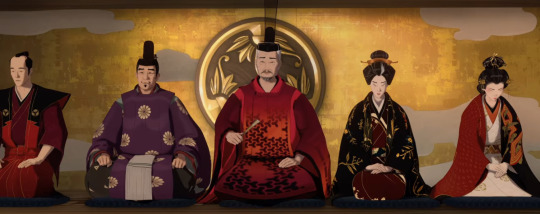
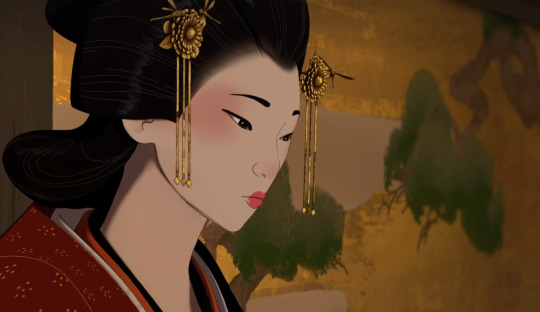

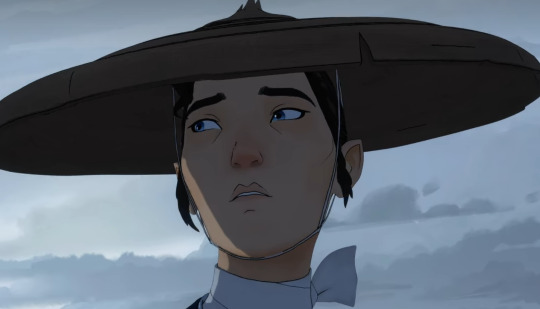
Akemi is always dressed in red, even her eyes are a bit of a reddish-brown rather than brown-black like most other characters, and in her penultimate scene she stands against a backdrop of flames. She is fire: quick-tempered, passionate, full of energy. Red is powerful, authoritative, and in eastern cultures, it is associated with prosperity.
Mizu is blue: her eyes, her sword, her clothes. She is also named after water; it's where she goes to recover, reflect and meditate. Water is fluid like a brook weaving around a stone in its path, always changing and adapting, it is graceful, it is beautiful and ruthless, tranquil yet swift.
Thus, in the future, I expect we will see plenty of political manoeuvring and intrigue in Akemi's plotline, where she fully embraces control of her life, and begins to take action to help others as well, realising that her own oppression is just one piece in a much larger picture. Her main conflict is with society.
In direct contrast, Mizu's main conflict is with herself. She must realise that her desire for vengeance is a projection of her own deep-rooted self-hatred. Her arc must move towards unpacking her feelings and trauma so she can be at peace with herself and allow space for love in her heart. Because as we saw in Ep5, Mizu had come extremely close to achieving peace and joy, as she had not only loved Mikio, but also had briefly believed that Mikio had loved her (and accepted her for who she is) as well.
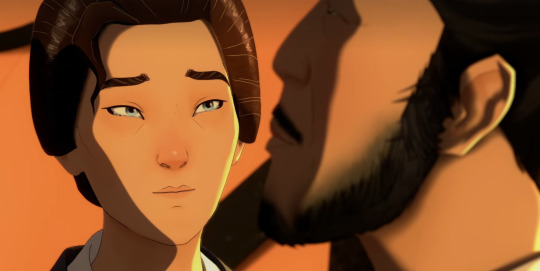
Thus, assuming the story is not planned as a tragedy, Mizu will likely end up getting her vengeance, but it will not satisfy her, because it is not what she needs. What she needs is to let go of the Onryo within her and to reconcile both The Ronin and The Bride within herself, as she is both a fighter and a lover, but not a monster.
(Edit: I recommend checking out this post by @stylographic-blue-rhapsody for a much clearer analysis about Mizu'a symbolism as Ronin, Bride and Onryo!)
And now that we've mostly covered each of the characters individually, we can finally get to the main point of this post: the love triangle.
--
Let's talk about Option A: Akemi.
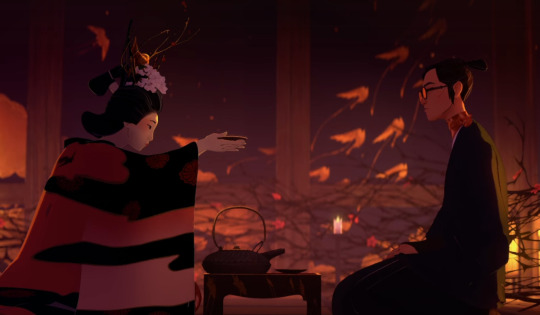
As I covered extensively earlier, Mizu and Akemi are foils, a yin-yang pair. But while they play off each other very well in a thematic sense, I personally believe that a serious romance between them will be more complicated if they become endgame. This is because Akemi's natural resolution is to embrace a position of power and influence, where she has both freedom and control over herself and to make much-needed changes in a prejudiced society. Meanwhile, Mizu's natural resolution is the opposite; her happy ending would to find a peaceful life where she is safe and free from prying eyes, and able to be her true self.
Thus, it would make very little sense for Akemi to forfeit power and run away with Mizu and start a humble life together. Akemi wants to be great, and that is absolutely what she deserves. On the other end of the spectrum, it would also make little sense for Mizu to dedicate her life in service of Akemi, such as acting as a bodyguard or something similar, because a life in a palace full of court intrigue and conspiracies is far from what Mizu needs to be happy.
With that being said, if Mizu/Akemi is endgame, and assuming their overarching character arcs do not shift directions, their love story would likely be either tragic, doomed, or bittersweet. I do absolutely love this type of story because personally I'm a sucker for catharsis, so it would be very interesting if the writers do decide to take this route.
Also, as a note, please do not take this as me dunking on this pairing. This is just my personal opinion and analysis and I completely understand if you disagree!
--
Then, of course, we have Option B: Taigen.
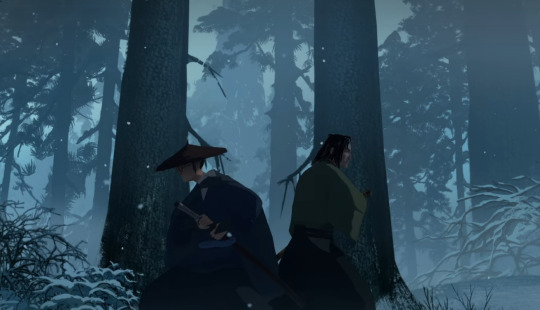
Between Akemi and Mizu, Taigen is a bit of a free-floater here, because Season 1 leaves off at a point where his arc is very ambiguous as to where it's headed. While Akemi climbs for greatness and Mizu goes on a journey across the ocean to (presumably) discover more about her heritage, we have little clues about where Taigen is headed. And if I'm being honest, I'm sure he has no idea either! He still hasn't reclaimed his honour, so he would be unable to rejoin the Shindo Dojo; he's been rejected by Akemi; and while he showed loyalty to the shogun, the shogun is now dead, and all the shogun's men who had witnessed his "humiliating" death were left to die by Lady Itoh, who is now pulling the strings within the palace.
Therefore, Taigen has very few options here.
And when considering his role in the story is as Mizu's begrudging ally, his arc will undoubtedly be focused on unlearning his xenophobia and misogyny, the latter of which we have not seen yet, but is surely present. Now, whether he will do this in Mizu's presence or absence will be unknown until we see Season 2. Following the Season 1 finale, he might return to Kohama and wait for Mizu there as he learns humility and remorse over his past cruelty; or maybe he will follow Mizu to London, and the two of them will continue to butt heads until he finally admits to himself that he cares for Mizu more than he would like to admit. There is no room for doubt that his growing feelings for Mizu are more-than-platonic, because we all saw him get turned on by sparring with her in Ep7 lol. Thus, regardless of the exact choice he makes, I am sure that his overall arc will be focused on redeeming his character.
Now, when it comes go redeeming him, I know there are many who simply don't want him redeemed because he was such a jerk to Mizu, and while yes I agree he was awful, I do believe there is also nuance to his character.
Previously I've discussed in great detail the colour and elemental symbolism with Mizu and Akemi, but have yet to touch on how they relate to Taigen. So, let's talk about that for a second.
While Akemi is red and Mizu is blue, Taigen is green.

Green is a complementary colour to Akemi's red. Complementary colours are directly opposite each other in the colour wheel; when mixed, they neutralise each other, but when put side-by-side, they form a pleasing and impactful contrast that boosts the brightness and prominence of both colours. This mirrors Taigen and Akemi's relationship. They are an "ideal" pair because they complement each other very well, and bring out each other's most prominent traits. Mizu's comment about their similar "brattiness" comes to mind here.

Green is also an analogous colour with Mizu's blue. These colours are sitting right next to each other on the colour wheel; their natural similarity makes it easy for them to form a cohesive overall appearance, but using both in equal amounts will make a design overwhelming and too busy. Thus, the best way to use analogous colours is to make one the dominant colour, while the other will serve as an accent. I feel this also speaks to the dynamic in Taigen and Mizu's relationship. They came from the space place, both from nothing; they're both strong fighters who love the sport, and work well together when fighting side-by-side; however, they butt heads too easily, mirroring how analogous colours can be too overwhelming when used in equal amounts. Thus, to work together in harmony, one has to be the dominant colour, while the other serves as the accent. In this case, the dominant force would be Mizu, as she is the protagonist of the story, while the accent would be Taigen.
By fulfilling this role as an "accent" to Mizu, Taigen's character would easily be slotted in as a the love interest. This is in contrast with a Mizu/Akemi relationship, whereby Akemi is Mizu's foil before she is Mizu's love interest. This is because, by being a love interest, a character usually takes a backseat in the story, serving the plot and the themes by playing a purely supportive role, and this is not possible in Akemi's case because her character exists to parallel and contrast Mizu (red and blue), and not to support her.
It is possible to serve as a supporting love interest in Taigen's case however. And this is because he, unlike the other characters, does not currently have a definitive place within the story. He initially served the plot as an antagonistic force, but now as he is slowly unlearning his prejudices and becoming a better person, he can no longer serve the story by acting purely as a rival.
Instead, he will serve the story by literally supporting Mizu. And this relates to Taigen being earth, which is steady, firm and reliable, unwavering in loyalty and principles, hardworking and rooted in stability, which is seen in Taigen's staunch and inflexible obedience to the traditions and rules of society. These traits are what make him a perfect samurai, but not a good man. However, unlike most people in their world, Taigen is still capable of change and redemption, which is why Mizu says that he has the potential to be great. Not great by way of power or glory, but great in character. Already, he is honourable to a fault, and does not betray Mizu even after she technically robbed him of everything he was striving towards. And when he was shot by an arrow in the chasm, he did not hesitate a second to tell Mizu to use him as a human shield and save herself.
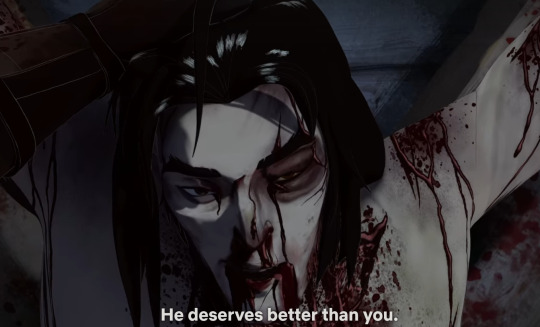
The trigger for his redemption is Mizu. If she had never beat him in that duel, Taigen would live on to become a man like Akemi's father. Cruel, power-hungry, controlling, conservative. But through Mizu, Taigen's sharp edges are ground down, much like water that wears down the stones in a river.
Where Mizu and Akemi's possible love story would be a clash of wills, full of passion and even heartbreak, a possible love story between Mizu and Taigen would be the wearing down of souls. Mizu would make Taigen a better person, and in turn Taigen would dedicate his full respect and support to Mizu as his equal, thus getting her to slowly open up and love herself. Already, Taigen has grown enough to admit (begrudgingly, and in his own Taigen way) that Mizu is better than him; though, clearly, he still has a long way to go, as he still calls Mizu a demon shortly after that.
But basically, Taigen is a very simple man (his main goal now is "to be happy"), and Mizu has great depths that he cannot yet fathom. For this love story to work, it has to begin with Taigen changing for the better. If he succeeds in that, and is able to accept Mizu for all her complexities, I believe that they will make a formidable pair. And though he'd likely still throw a jab or snarky remark at Mizu every now and then, I think he'd come tl wholeheartedly admire Mizu as a brilliant swordsman and a kind soul. Thus, should things work out and this be endgame, Taigen would be able to provide Mizu with what Mikio could not: an idyllic life that is not built on a lie, but mutual trust, respect, admiration, and equality.
Or hey, maybe they could both make their own dojo together! I don't know.
(Edit: This post by @rinandsketches does a great job at delving into Taigen's character and a potential Mizu/Taigen relationship if you'd like to read more about this angle!)
--
Now, as I move on from Taigen, there are a couple more options on how to resolve this love triangle and that includes Option C: Ringo.
In this option, Mizu does not have an endgame romance with either Akemi or Taigen. In this route, she finds peace and love through friendship, solidarity, and a found family between herself, Ringo and Master Eiji—a bunch of outcasts in society who make a strong trifecta of sword-makers.
Also, as an aside while I'm talking about Ringo, I'd like to point out that I believe his element is air and his colour is a neutral grey; he is talkative, easy-going, wise, curious, light on his feet (stealthy) and free-spirited, which are all traits linked to air, and traits that complement Mizu nicely, as he is capable of getting Mizu to open up and trust others again, while Mizu helps him reach his true potential for greatness.
--
And finally, there's Option D: Polyamory.
This is basically an "all of the above" option, in which everyone wins and it's a super duper happy ending. It would also be awesome to get some polyamorous representation, and seeing the dynamic between Akemi/Mizu/Taigen play out would be very entertaining and refreshing. So, you never know, this just might be the true endgame!
--
AAAAND with that, I close my extremely long analysis of what is essentially Mizu's love life. Whatever the final outcome of this love triangle though, I just hope it will be well-written and satisfying to all the characters' respective arcs. (Also I just want Mizu to be HAPPY goddamn it because she deserves the world and her coochie eaten out)
Now, I highly doubt anyone will read any of this (especially not until the end!) but that's fine. I just have so many thoughts and feelings about this show and I just needed to get this out of my system lol! But if by some miracle you did read this far, I wholeheartedly welcome any sharing of thoughts and ideas because man am I obsessed with this show! But of course, if we have an opposing opinions, please be respectful when letting me know; I am very open to friendly discussions.
#blue eye samurai#mizu x taigen#mizu x akemi#mizu blue eye samurai#mizu x akemi x taigen#blue eye samurai meta#also if you ask me PERSONALLY. based on my own analysis which you can read above. personally i'm placing my bets on option b (mizutaigen)#and this is simply bcs i think mizu deserves nice things and that includes getting dicked down and pampered and worshipped#whoops who said that#also mizu deserves to live a life where she can hand taigen's ass to him on a daily basis. ykwim.#BUT i am def open to a change of opinion regarding the mizuakemi rship as the story progresses#i just dont want the writers to reduce akemi into nothing but a love interest for mizu#the only way i can see a happy mizuakemi endgame scenario is if blue eye samurai becomes purely an angsty romance story#in which case then yes i fully endorse the akemi ending <3#but that would probs require a whole genre overhaul? bcs currently the show is firstly an action-epic where the romance is just a subplot#but even tho i dont reeeeally want a mizuakemi endgame i still DEF want mizu & akemi to be romantically and/or sexually involved plsss <3#like they cant have that slow-mo shot between the two of them as their first encounter and NOT DO ANYTHING W IT!!!#also i want mizu to be at LEAST a little sapphic plsplspls#shut up haydar#meta dissertations.pdf#haydar's fandom posts#i wrote this whole thing while delirious and covid positive
432 notes
·
View notes
Text
Pain. All I know is pain. Lemon juice on a paper cut pain.

#*raises fist in air* NICKELODEON!!!#we should've gotten this simply to save us years of mischaracterization on the SR end#rottmnt#samurai rabbit#rise of the teenage mutant ninja turtles#rise of the tmnt#samurai rabbit the usagi chronicles#tmnt#not lego
82 notes
·
View notes
Text
samumenco you would have thrived if you aired in this era. you would have done numbers. you would have been an it girl
#samurai flamenco#truly so ahead of its time. the people of 2013 were simply not ready for what you were
97 notes
·
View notes
Text
[dumps samurai fixation on the table] lets talk about cyllene's involvement in the satsuma rebellion
#that is.. i think she'd be firmly on the side of the emperor. sorry saigo but your dreams were far too ambitious#☆ ooc#she's content in letting her samurai name be simply a thing of the past and accepting her future as someone with#influence. just dont tell her that very soon even the influence of samurai names will become very fleeting
11 notes
·
View notes
Text
MORE THOUGHTS ON BLUE EYE SAMURAI...

So this is spoiler-filled and assumes you've seen the show.
I don't like giving spoilers if a piece of media is good so... last warning:
I was worried that they'd make Mizu a woman in the typical way, even when disguised as a man. Suddenly she becomes the "girl with the ponytail and glasses" who is actually stunningly beautiful when not in her protective disguise...yellow glasses included, because yellow and blue make green, and green eyes *were* a more common color within east Asian communities.
I like that detail. I love that she is drawn as a handsome woman. Which makes sense given her upbringing and training. Not pretty ~*because of her blue eyes*~. This is what I meant by the fetish thing. That bothered me so much for Memoirs of Geisha... It smacks of this thing certain men do when they gaze upon what they perceive as mixed-raced women. A disgusting eye that perceives any presumed "whiteness" as what makes a person of color beautiful. It's gross and having seen that two mixed-race Asian women had a hand in writing/producing this, I get why that aspect was treated well this time. The romantic in me also loved the nibbles of tension between Mizu and Taigen, and Mizu and Akemi, and even Akemi and Taigen... Just. The relationships are so well-done. Ringo is a gem of a person, and honestly the bravest and most decent character in the show. Episode 5, remains the high-point. That Bunraku (Japanse puppet theatre) framing for the flashback and that crushing climax.
My heart broke for the death of Mizu's heart and most of her humanity. I felt the air sort of let off slowly in that last ep instead of the blast of relief I expected, but I'm here for Mizu killing those white men. The fight choreography was exquisitely planned and filmed. Live action could learn something from the framing of certain moves in this, but there were a few moments when injuries definitely should have affected more than they did...Though, that is also a trope of the genre. I'm just totally gripped by these characters and will be here for season two. If we get one.
PLEASE WATCH IT so we get those four seasons!
#blue eye samurai#I also loved the animation style#which combined 2d we need more 2d!!!#with some 3d elements#this show is too good to see fail simply because Netflix doesn't know#how to promote it properly#especially when so much BTS is from Japanese-Americans
71 notes
·
View notes
Text


∘•···············•∘ʚ ♡ ɞ∘•················•∘
indecisive ass can't make a decision on shit 🎀🎀
∘•···············•∘ʚ ♡ ɞ∘•················•∘
#rorouchooo .ᐟ.ᐟ#... ...#blue eye samurai#bes#blue eye samurai au#bes au#orphic ruse au#oc post#my ocs <333#blue eye samurai oc#junicharine sterling#simply filler for now#<333
10 notes
·
View notes
Text

they fucked up the plan
#simply a quick sketch of a scene#craurpuri#blue eye samurai#bes#digital art#digital sketch#blue eye samurai au#reverie vignettes#bes au#bes mizu#bes taigen#dying slowly 🧚♀️🧚♀️🧚♀️
14 notes
·
View notes
Text

mildly miffed by welfare status
#fate samurai remnant#fate grand order#fgo#miyamoto iori#my art#doodle#fsr#fate series#ough iori concept art#if god cannot give me what i want i will simply make it myself
31 notes
·
View notes
Text
cutting between mizu watching the throuple kiss and her wrestle with taigen is crazy btw . . . cannot articulate my thoughts properly for the life of me but something about love/desire and hate being synonymous in passion and that manifesting physically, whether that be sex or violence.
#the two shots had the same lighting too hello 😭 ??#blue eye samurai#simply unwell. i will proceed to think about them even more#na's chatter
37 notes
·
View notes
Text
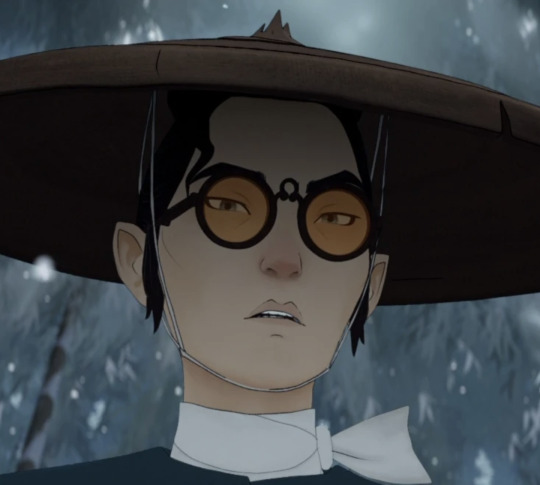
I watched all eight episodes of season 1 of Blue Eye Samurai over the weekend. I then went browsing because I wanted to read some online reviews of the show to see what people were thinking of it and also because I wanted to interact with gifs and art, as the series is visually stunning.
Yet, in my search for opinions on the show, I came across several points I'd like to address in my own words:
Mizu’s history and identity are revealed piece-by-piece and the “peaches” scene with Mizu and Ringo at the lake is intended to be a major character reveal. I think it’s weird that some viewers got angry over other viewers intentionally not gendering Mizu until that reveal, rather than immediately jumping to gender the character as the other characters in the show do. The creators intentionally left Mizu’s gender and sexuality ambiguous (and quite literally wrote in lines to lead audiences to question both) to challenge the viewer’s gut assumption that this lone wolf samurai is a man. That intentional ambiguity will lead to wide and ambiguous interpretations of where Mizu fits in, if Mizu fits in at all. But don't just take my word for this:
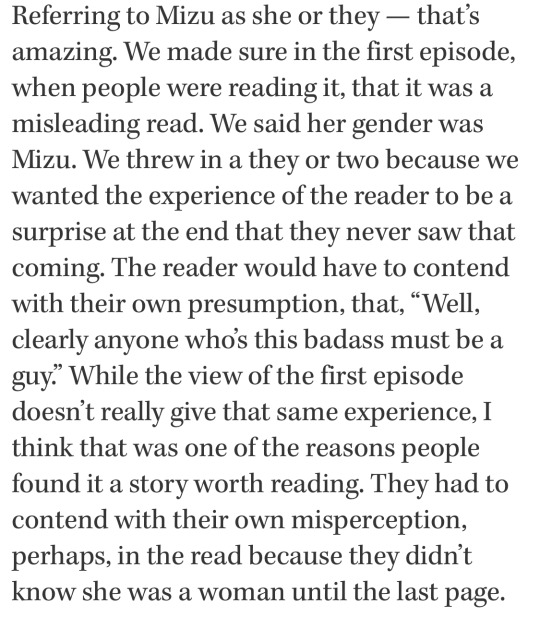
Re: above. I also think it’s weird that some viewers got upset over other viewers continuing to acknowledge that Mizu has a very complicated relationship with her gender, even after that reveal. Canonically, she has a very complicated relationship with her identity. The character is intended to represent liminality in identity, where she’s often between identities in a world of forced binaries that aren’t (widely) socially recognized as binaries. But, again, don’t just take my word for this:
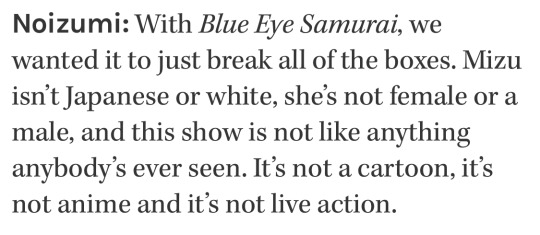
Mizu is both white and Japanese, but she is also not white and not Japanese simultaneously (too white to be Japanese and too Japanese to be white). She’s a woman and a man. She’s a man who’s a woman. She’s also a woman who’s not a woman (yet also not quite a man). But she’s also a woman; the creators said so. Mizu was raised as a boy and grew into a man, yet she was born a girl, and boyhood was imposed upon her. She’s a woman when she’s a man, a man when she’s a man, and a woman when she’s a woman.
Additionally, Mizu straddles the line between human and demon. She’s a human in the sense she’s mortal but a demon in the sense she’s not. She's human yet otherworldly. She's fallible yet greatness. She's both the ronin and the bride, the samurai and the onryō. In short, it’s complicated, and that’s the point. Ignoring that ignores a large part of her internal character struggle and development.
Mizu is intended to represent an “other,” someone who stands outside her society in every way and goes to lengths to hide this “otherness” to get by. Gender is a mask; a tool. She either hides behind a wide-brimmed hat, glasses, and laconic anger, or she hides behind makeup, her dress, and a frown. She fits in nowhere, no matter the identity she assumes. Mizu lives in a very different time period within a very different sociocultural & political system where the concept of gender and the language surrounding it is unlike what we are familiar with in our every-day lives. But, again, don’t just take my word for this:
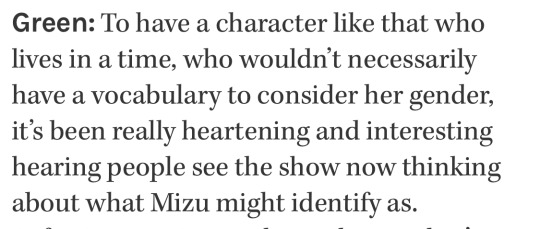
It’s also weird that some viewers have gotten upset over the fact women and queer people (and especially queer women) see themselves in Mizu. Given her complicated relationship with identity under the patriarchy and colonial violence, I think Mizu is a great character for cis-het women and queer folks alike to relate to. Her character is also great for how she breaks the mold on the role of a biracial character in narratives about identity (she’s not some great bridge who will unite everyone). It does not hurt anyone that gender-fluid and nonbinary people see themselves in Mizu's identity and struggle with identity. It does not hurt anyone that lesbians see themselves in the way Mizu expresses her gender. It does not hurt anyone that trans men see themselves in Mizu's relationship with manhood or that trans women can see themselves in Mizu when Mama forces her to be a boy. It's also really cool that cis-het women see themselves in Mizu's struggles to find herself. Those upset over these things are missing critical aspects of Mizu's character and are no different from the other characters in the story. The only time Mizu is herself is when she’s just Mizu (“…her gender was Mizu”), and many of the other characters are unwilling to accept "just Mizu." Accepting her means accepting the complicatedness of her gender.
Being a woman under the patriarchy is complicated and gives women a complicated relationship with their gender and identity. It is dangerous to be a woman. Women face violence for being women. Being someone who challenges sex-prescribed norms and roles under patriarchy also gives someone a complicated relationship with their identity. It is dangerous to usurp gender norms and roles (then combine that with being a woman...). People who challenge the strict boxes they're assigned face violence for existing, too. Being a racial or ethnic minority in a racially homogeneous political system additionally gives someone a complicated relationship with their identity. It is dangerous to be an ethnic minority when the political system is reproduced on your exclusion and otherness. They, too, face violence for the circumstances of their birth. All of these things are true. None of them take away from the other.
Mizu is young-- in her early 20s-- and she has been hurt in deeply affecting ways. She's angry because she's been hurt in so many different ways. She's been hurt by gender violence, like "mama's" misogyny and the situation of her birth (her mother's rape and her near murder as a child), not to mention the violent and dehumanizing treatment of the women around her. She's been hurt by racial violence, like the way she has been tormented and abused since childhood for the way she looks (with people twice trying to kill her for this before adulthood). She's been hurt by state-sanctioned violence as she faces off against the opium, flesh, and black market traders working with white men in contravention of the Shogun's very policies, yet with sanction from the Shogun. She's been hurt by colonial violence, like the circumstances of her birth and the flood of human trafficking and weapons and drug trafficking in her country. She's had men break her bones and knock her down before, but only Fowler sexually differentiated her based on bone density and fracture.
Mizu also straddles the line between victim and murderer.
It seems like Mizu finding her 'feminine' and coming to terms with her 'female side' may be a part of her future character development. Women who feel caged by modern patriarchal systems and alienated from their bodies due to the patriarchy will see themselves in Mizu. They understand a desire for freedom that the narrow archetypes of the patriarchy do not afford them as women, and they see their anger and their desire for freedom in Mizu. This, especially considering that Mizu's development was driven by one of the creators' own experiences with womanhood:
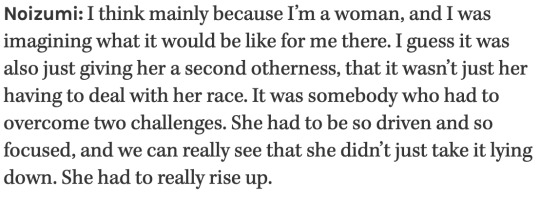
No, Mizu does not pass as a man because she "hates women" or because she hates herself as a woman or being a woman. There are actual on-screen depictions of Mizu's misogyny, like her interactions with Akemi, and dressing like a man is not an instance of this. Mizu shows no discomfort with being a woman or being seen as a woman, especially when she intends to pass herself as and present as a woman. Mizu also shows the women in the series more grace and consideration than any man in the show, in whatever capacity available to her socially and politically, without revealing herself; many of the women have remarked that she is quite unlike other men, and she's okay with that, too.
When she lives on the farm with Mama and Mikio, Mizu shows no discomfort once she acclimates to the new life. But people take this as conclusive evidence of the "only time" she was happy. She was not. This life was also a dance, a performance. The story of her being both the ronin and the onryō revealed to the audience that this lifestyle also requires her to wear a mask and dance, just as the bride does. This mask is makeup, a wedding dress, and submission, and this performance is her gender as a wife. She still understands that she cannot fully be herself and only begins to express happiness and shed her reservation when she believes she is finally safe to be herself. Only to be betrayed. Being a man is her safety, and it is familiar. Being a boy protected her from the white men as a child, and it might protect her heart now.
Mizu shows no discomfort with being known as a woman, except when it potentially threatens her goals (see Ringo and the "peaches" scene). She also shows no discomfort with being known as, seen as, or referred to as a man. As an adult, she seems okay- even familiar- with people assuming she's a man and placing her into the role of a man. Yet, being born a girl who has boyhood violently imposed upon her (she did not choose what mama did to her) is also an incredibly important part of her lived experience. Being forced into boyhood, but growing into a man anyway became part of who she is. But, being a man isn’t just a part of who she became; it’s also expedient for her goals because men and women are ontologically different in her world and the system she lives under.
She's both because she's neither, because- ontologically- she fits nowhere. When other characters point out how "unlike" a man she is, she just shrugs it off, but not in a "well, yeah, because I'm NOT a man" sort of way, but in an "I'm unlike anyone, period," sort of way. She also does not seem offended by Madam Kaji saying that Mizu’s more man than any who have walked through her door.
(Mizu doesn’t even see herself as human, let alone a woman, as so defined by her society. And knowing that creators have stated her future arc is about coming into her “feminine era” or energy, I am actually scared that this show might fall into the trope of “domesticating”/“taming” the independent woman, complete with an allegory that her anger and lack of human-ness [in Mizu’s mind] is a result of a woman having too much “masculine energy” or being masculine in contravention of womanness.)
Some also seem to forget that once Mama and Mikio are dead, no one knows who she is or where she came from. They do not have her background, and they do not know about the bounty on her (who levied the bounty and why has not yet been explained). After their deaths, she could have gone free and started anew somehow. But in that moment, she chose to go back to life as a man and chose to pursue revenge for the circumstances of her birth. Going forward, this identity is no longer imposed upon her by Mama, or a result of erroneous conclusions from local kids and Master Eiji; it was because she wanted people to see her as a man and she was familiar with navigating her world, and thus her future, as a man. And it was because she was angry, too, and only men can act on their anger.
I do think it important to note that Mizu really began to allow herself to be vulnerable and open as a woman, until she was betrayed. The question I've been rattling around is: is this because she began to feel safe for the first time in her life, or is this part of how she sees women ontologically? Because she immediately returns to being a man and emotionally hard following her betrayal. But, she does seem willing to confide in Master Eiji, seek his advice, and convey her anxieties to him.
Being a man also confines Mizu to strict social boxes, and passing herself as a man is also dangerous.
Mizu doesn't suddenly get to do everything and anything she wants because she passes as a man. She has to consider her safety and the danger of her sex being "found out." She must also consider what will draw unnecessary attention to her and distract her from her goals. Many viewers, for example, were indignant that she did not offer to chaperone the mother and daughter and, instead, left them to the cold, only to drop some money at their feet later. The indignity fails consider that while she could bribe herself inside while passing as a man, she could not bribe in two strangers. Mizu is a strange man to that woman and does not necessarily have the social position to advocate for the mother and daughter. She also must consider that causing small social stirs would distract from her goals and draw certain attention to her. Mizu is also on a dangerous and violent quest.
Edo Japan was governed by strict class, age, and gender rules. Those rules applied to men as well as women. Mizu is still expected to act within these strict rules when she's a man. Being a man might allow her to pursue revenge, but she's still expected to put herself forward as a man, and that means following all the specific rules that apply to her class as a samurai, an artisan (or artist), and a man. That wide-brimmed hat, those orange-tinted glasses, and her laconic tendencies are also part of a performance. Being a boy is the first mask she wore and dance she performed, and she was originally (and tragically) forced into it.
Challenging the normative identities of her society does not guarantee her safety. She has limitations because of her "otherness," and the transgression of sex-prescribed roles has often landed people in hot water as opposed to saving them from boiling. Mizu is passing herself off as a man every day of her life at great risk to her. If her sex is "found out" on a larger scale, society won’t resort to or just start treating her as a woman. There are far worse fates than being perceived as a woman, and hers would not simply be a tsk-tsk, slap on the wrist; now you have to wear makeup. Let's not treat being a woman-- even with all the pressures, standards, fears, and risks that come with existing as a woman-- as the worst consequence for being ‘found out’ for transgressing normative identity.
The violence Mizu would face upon being "found out" won’t only be a consequence of being a "girl." Consider not just the fact she is female and “cross-dressing” (outside of theater), but also that she is a racial minority.
I also feel like many cis-het people either ignore or just cannot see the queerness in challenging gender roles (and thus also in stories that revolve around a subversion of sex-prescribed gender). They may not know how queerness-- or "otherness"-- leads to challenging strict social stratifications and binaries nor how challenging them is seen by the larger society as queer ("strange," "suspicious," "unconventional," even "dishonorable," and "fraudulent"), even when "queerness" (as in LGBTQ+) was not yet a concept as we understand it today.
Gender and sexuality- and the language we use to communicate who we are- varies greatly across time and culture. Edo Japan was governed by strict rules on what hairstyles, clothes, and weapons could be worn by which gender, age, and social group, and this was often enshrined in law. There were specific rules about who could have sex with whom and how. These values and rules were distinctly Japanese and would not incorporate Western influences until the late 1800s. Class was one of the most consequential features to define a person's fate in feudal Japan, and gender was quite stratified. This does not mean it's inappropriate for genderqueer people to see themselves in Mizu, nor does this mean that gender-variant identities didn’t exist in Edo Japan.
People in the past did not use the same language we do today to refer to themselves. Example: Alexander The Great did not call himself a "bisexual." We all understand this. However, there is a very weird trend of people using these differences in language and cultures across time to deny aspects of a historical person's life that societies today consider taboo, whether these aspects were considered taboo during that historical time period or not. Same example: people on Twitter complaining that Netflix "made" Alexander The Great "gay," and after people push back and point out that the man did, in fact, love and fuck men, hitting back with "homosexuality wasn't even a word back then" or "modern identity didn't exist back then." Sure, that word did not exist in 300s BCE Macedonia, but that doesn't mean the man didn't love men, nor does that mean that we can't recognize that he'd be considered "queer" by today's standards and language.
Genderqueer, as a word and as the concept is understood today, did not exist in feudal Japan, but the people did and feudal Japan had its own terms and concepts that referred to gender variance. But while the show takes place in Edo Japan, it is a modern adult animation series made by a French studio and two Americans (nationality). Mizu is additionally a fictional character, not a historical figure. She was not created in a vacuum. She was created in the 21st century and co-written by a man who got his start writing for Sex in the City and hails from a country that is in the midst of a giant moral panic about genderqueer/gender-variant people and gender non-conforming people.
This series was created by two Americans (nationality) for an American company. In some parts of that country, there are laws on the book strictly defining the bounds of men and women and dictating what clothes men and women could be prosecuted for wearing. Changes in language and identity over time mean that we can recognize that if Mizu lived in modern Texas, the law would consider her a drag performer, and modern political movements in the show creators' home country would include her under the queer umbrella.
So, yeah, there will also be genderqueer people who see themselves in Mizu, and there will be genderqueer fans who are firm about Mizu being queer to them and in their “headcanons.” The scene setting being Edo Japan, does not negate the modern ideas that influence the show. "Nonbinary didn't exist in Edo Japan" completely ignores that this show was created to explore the liminality of modern racial, gender, class, and normative identities. One of the creators was literally inspired by her own relationship with her biracial identity.
Ultimately, the fact Mizu, at this point in her journey, chooses to present and pass as a man and the fact her presented gender affects relationship dynamics with other characters (see: Taigen) gives this story a queer undertone. And this may have been largely unintentional: "She’s a girl, and he’s a guy, so, of course, they get together," < ignoring how said guy thinks she’s a guy and that she intentionally passes herself as a guy. Audiences ARE going to interpret this as queer because WE don’t live in Edo-era Japan. And I feel like people forget that Mizu can be a woman and the story can still have queer undertones to it at the same time.
#Blue Eye Samurai#‘If I was transported back in time… I’d try to pass myself off as a man for greater freedom.’#^^^ does not consider the intersection of historically queer existence across time with other identities (& the limitations those include)#nor does it consider the danger of such an action#I get it. some come to this conclusion simply because they know how dangerous it is to be a woman throughout history.#but rebuking the normative identities of that time period also puts you at great risk of violence#challenging norms and rules and social & political hierarchies does not make you safer#and it has always been those who exist in the margins of society who have challenged sociocultural systems#it has always been those at greatest risk and who've faced great violence already. like Mizu#Anyway... Mizu is just Mizu#she is gender queer (or gender-variant)#because her relationship with her gender is queer. because she is gender-variant#‘queer’ as a social/political class did not exist. but people WE understand as queer existed in different historical eras#and under different cultural systems#she’s a woman because queer did not exist & ‘woman’ was the sex caste she was born into#she’s also a woman because she conceptualizes herself as so#she is a woman AND she is gender-variant#she quite literally challenges normative identity and is a clear example of what sex non-conforming means#Before the actual. historic Tokugawa shogunate banned women from theater#there were women in the theater who cross-dressed for the theater and played male roles#so I’m also really tired of seeing takes along the lines of: ‘Edo Japan was backwards so cross dressers did’t exist then!’#like. please. be more transparent won’t you?
21 notes
·
View notes
Text
If Iori ever gets added to fgo as a servant I would love to see him have lines for the servants Musashi had contact with in the story, People like the servants from Shimousa duels or Olympus would be great. I want to see what he thinks of his dadmoms journey
#fgo#fate grand order#miyamoto iori#miyamoto musashi#fate samurai remnant#i haven't actuality played Samurai remnant yet because im simply broke#but he seems cool#and i want to know what he thinks of people like Douman or Caenis
35 notes
·
View notes
Text
Sometimes I make silly writing decisions, like making Taigen into a chill yet arrogant guy who calls everyone 'man' and is just trying to have fun in life. I have no regrets.
#fanfiction#blue eye samurai#taigen#modern AU#writing#he's simply a silly guy now#he became friends with Ringo#and it made him much less arrogant then he once was#that's my take on them anyway#lol
11 notes
·
View notes
Text
.. I genuinely hope none of my ocs ever find a way to break into the real world. I'd cry because I know deep down they'd be out for blood. mine specifically 😔😔



i love making partners for the same damn character like that could never get old 🥰🥰 !! its just new dynamics to explore everytime!!
#i give my ocs a little too much of a reason to build my grave personally#its simply not an issue until it becomes an issue#craurpuri#blue eye samurai#bes#digital art#digital sketch#blue eye samurai oc#bes mizu#craurpuri's ocs#oinao jii#oinao jii oc#sunder / viviane winfredel#sunder / viviane winfredel oc
9 notes
·
View notes